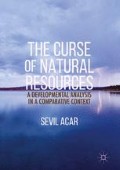Abstract
The term “resource curse” has been coined to manifest how resource abundant countries lack the ability to manage their resource gifts in order to flourish their economies, and how, instead, they end up with lower economic growth rates than those that have scarce or no resources at all. What remains to be explored is detecting whether resources have implications for development prospects other than growth. Acar explores such implications for both human development, measured by the Human Development Index, and sustainable development, measured by Genuine Savings, with a specific focus on minerals, fuels, and agricultural resources, from an institutional perspective. Besides this, Acar employs a comparative analysis of the economic evolution of Norway with respect to that of Sweden before and after oil was discovered in Norway.
Access this chapter
Tax calculation will be finalised at checkout
Purchases are for personal use only
References
Acemoglu, D., S. Johnson, and J.A. Robinson. 2001. The Colonial Origins of Comparative Development: An Empirical Investigation. American Economic Review 91(5): 1369–401.
Acemoglu, D., S. Johnson, and J.A. Robinson. 2002. Reversal of Fortune: Geography and Institutions in the Making of the Modern World Income Distribution. Quarterly Journal of Economics 117(4): 1231–1294.
Ahammad, H., and K. Clements. 1999. What Does Minerals Growth Mean to Western Australia? Resources Policy 25: 1–14
Auty, R. 1993. Sustaining Development in Mineral Economies: The Resource Curse Thesis. London: Routledge
Auty, R. 2001. The Political Economy of Resource-Driven Growth. European Economic Review 45: 827–838.
Bulte, E.H., R. Damania, and R.T. Deacon. 2005. Resource Intensity, Institutions and Development. World Development 33: 1029–1044
Clements, K.W., and P.L. Johnson. 2003. The Minerals Industry and Employment in Western Australia: Assessing Its Impacts in Federal Electorates. Resources Policy 26: 77–89
Davis, G.A. 1998. The Minerals Sector, Sectoral Analysis, and Economic Development. Resources Policy 24(4): 217–228.
Deacon, R. 2010. Political Economy Dimensions in Natural Resource Economics. Presented at the Ulvön Conference on Environmental Economics, Umeå, Sweden, June 22.
Easterly, W., and R. Levine. 2003. Tropics, Germs, and Crops: How Endowments Influence Economic Development. Journal of Monetary Economics 50(1): 3–39.
Frankel, J.A. 2010. The Natural Resource Curse: A Survey. NBER Working Papers 15836, National Bureau of Economic Research, Inc.
Gelb, A. 1988. Oil Windfalls: Blessing or Curse? New York: Oxford University Press.
Gidwitz, Z., M.P. Heger, J. Pineda, and F. Rodríguez. 2010. Understanding Performance in Human Development: A Cross-National Study. UNDP Human Development Research Paper 2010/42.
Isham, J., M. Woolcook, L.Pritchett, and G. Busby. 2005. The Varieties of Resource Experience: Natural Resource Export Structures and the Political Economy of Economic Growth. The World Bank Economic Review 19(2): 141–174.
Mehlum H., K. Moene, and R. Torvik. 2006. Institutions and the Resource Curse. The Economic Journal 116: 1–20.
Rodrik, R., A. Subramanian, and F. Trebbi. 2004. Institutions Rule: The Primacy of Institutions over Geography and Integration in Economic Development. Journal of Economic Growth 9(2): 131–165.
Sachs, J.D., and A.M. Warner. 1997a. Natural Resource Abundance and Economic Growth. CID and Harvard Institute for International Development, Mimeo.
Sachs, J.D., and A.M. Warner. 1997b. Sources of Slow Growth in African Economies. Journal of African Economies 6(3).
Sala-i-Martín, X. and A. Subramanian. 2003. Addressing the Natural Resource Curse: An Illustration from Nigeria. Economics Working Papers 685, Department of Economics and Business, University of Pompeu Fabra.
Stijns, J.P.C. 2002. Natural Resource Abundance and Economic Growth Revisited. Working Paper University of California at Berkeley.
Torvik, R. 2009. Why Do Some Resource-Abundant Countries Succeed While Others Do Not? Oxford Review of Economic Policy 25(2): 241–256.
van der Ploeg, F. 2011. Natural Resources: Curse or Blessing? Journal of Economic Literature 49(2): 366–420.
World Economic and Social Survey. 2006. Diverging Growth and Development, United Nations, New York. Available at http://www.un.org/en/development/desa/policy/wess/wess_archive/2006wess.pdf
Author information
Authors and Affiliations
Copyright information
© 2017 The Author(s)
About this chapter
Cite this chapter
Acar, S. (2017). Introduction. In: The Curse of Natural Resources. Palgrave Macmillan, New York. https://doi.org/10.1057/978-1-137-58723-7_1
Download citation
DOI: https://doi.org/10.1057/978-1-137-58723-7_1
Published:
Publisher Name: Palgrave Macmillan, New York
Print ISBN: 978-1-137-58722-0
Online ISBN: 978-1-137-58723-7
eBook Packages: Economics and FinanceEconomics and Finance (R0)

